Political career of Arnold Schwarzenegger
The political career of Arnold Schwarzenegger began in 2003, when Arnold Schwarzenegger entered politics for the first time by running for Governor of California in a recall election. He was subsequently elected Governor when then-Governor Gray Davis was successfully recalled and served the remainder of Davis' term between 2003 and 2007. Schwarzenegger was then reelected to a second term in 2006 to serve his first full term between 2007 and 2011. Schwarzenegger was unable to run for a third term due to term limits imposed by Constitution of California, but has still been involved in politics and the promotion of environmentalism.
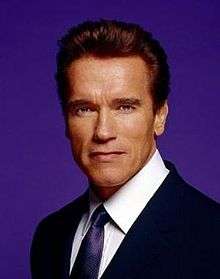
| ||
|---|---|---|
|
Bodybuilding and business career
|
||
Early politics
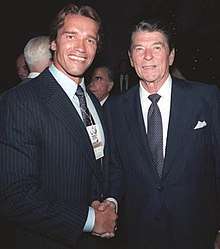
In Austria, Schwarzenegger was officially a member of the youth weightlifting team of the Austrian People's Party (ÖVP).[1]
In 1985, Schwarzenegger appeared in "Stop the Madness", an anti-drug music video sponsored by the Reagan administration. He first came to wide public notice as a Republican during the 1988 presidential election, accompanying then-Vice President George H. W. Bush at a campaign rally.[2]
.jpg)
Governor of California
First term
The first term of Arnold Schwarzenegger as Governor of California began on November 17, 2003, and ended on January 3, 2007. Campaigning for Governor of California as a member of the Republican Party, Schwarzenegger was elected on October 7, 2003, defeating incumbent Democratic governor Gray Davis in the California gubernatorial recall election. In the first year of his first term as governor, Schwarzenegger proposed deep cuts in the state budget and was met with opposition in the California State Legislature. When San Francisco started granting same-sex marriage licenses at the behest of mayor Gavin Newsom, the governor ordered state attorney general Bill Lockyer to intervene in the matter and vetoed legislation that would have legalized same-sex marriage. Because of their opposition to his budget cuts, Schwarzenegger controversially called his opponents in the legislature girlie men. At the 2004 Republican National Convention, Schwarzenegger gave a speech endorsing the reelection of George W. Bush as President of the United States.
In his State of the State address in 2005, Schwarzenegger proposed a redistricting reform that would have retired judges drawing new districts for the state. The first executions of Schwarzenegger's term occurred in 2005 with Donald Beardslee in January and Stanley Williams in December, which drew opposition from opponents of capital punishment and his native country of Austria. In June, the governor called for a special election in an effort to pass several of his proposed reforms. However, the voters ultimately rejected all of Schwarzenegger's propositions.
Schwarzenegger started off 2006 by apologizing for holding the special election, which had cost the state money, and proposed a centrist agenda moving forward. The governor opposed the federal government's effort to build fencing on the Mexico–United States border and likened it to the Berlin Wall. In 2006, Schwarzenegger made several efforts to address global warming by signing the Global Warming Solutions Act of 2006 and negotiating the creation of a carbon emissions trading market with British Prime Minister Tony Blair. By year's end, the governor called on the federal government to give a deadline for the withdrawal of U.S. troops from Iraq.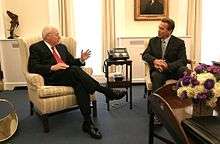
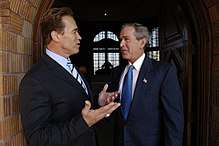
Second term
The second term of Arnold Schwarzenegger as Governor of California began on January 5, 2007 and ended on January 3, 2011. On November 7, 2006, the Republican incumbent Arnold Schwarzenegger defeated Democratic state treasurer Phil Angelides in the California gubernatorial election to win a second term as Governor of California. Now in his new term, Schwarzenegger pledged to be a centrist politician and cooperate with the Democrats to resolve statewide political issues. Only days into the term, the governor proposed universal health insurance in the state and called for new bonds for schools, prisons, and other infrastructure. In May 2007, Schwarzenegger met with two of his counterparts in Canada, Dalton McGuinty and Gordon Campbell, in order to address climate change and advocate for stem cell research. An oil spill occurred in November when the Cosco Busan struck the San Francisco–Oakland Bay Bridge.
In 2008, Schwarzenegger proposed a balanced budget amendment to the state constitution. The governor also proposed an austere fiscal policy in response to the Great Recession. In the United States presidential election, Schwarzenegger endorsed John McCain. Continuing his efforts to address environmental issues, the governor signed a memorandum of understanding with Mexican President Felipe Calderón and signed legislation pertaining to global warming. However, by October, Schwarzenegger vetoed 35 percent of the bills that the California State Legislature passed, which was the highest the rate had ever been since the statistic was first tracked when Ronald Reagan was governor of the state. In the election, voters approved Proposition 11, which shifted redistricting powers away from the legislature and created the California Citizens Redistricting Commission.
In the midst of the Great Recession in 2009, Schwarzenegger called upon the legislature to pass deep budget cuts and warned that the state was facing insolvency. At the same time, the governor approved of President Barack Obama's federal stimulus bill. Schwarzenegger appointed Laura Chick as inspector general to oversee California's share of the stimulus bill. In May, the governor voiced his support for marijuana legalization and a special election resulted in all but one of the state's propositions being rejected.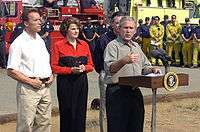

Later politics
On January 27, 2011, Schwarzenegger mistakenly praised Canadian soldiers serving in Iraq, even though they did not.[3]
On October 4, 2012, Schwarzenegger said Republican presidential nominee Mitt Romney performed better than President Barack Obama in the first debate.[4]
On August 23, 2014, Schwarzenegger and other Hollywood stars expressed their support for Israel and criticized Hamas for the "devastating loss of life endured by Israelis and Palestinians in Gaza".[5][6]
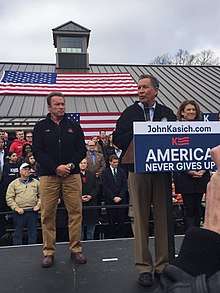
On March 6, 2016, Schwarzenegger endorsed Ohio Governor John Kasich for the Republican nomination for president, saying his experience in government made him "an action hero".[7] On June 7, Schwarzenegger's spokesperson Daniel Ketchell told Los Angeles Times' Seema Mehta on Twitter that Schwarzenegger voted for Kasich in the California Republican primary, even though Kasich already suspended his campaign.[8] On October 8, Schwarzenegger announced that he would not vote for Donald Trump to be president. The statement was made one day after the release of the Donald Trump Access Hollywood tape.[9]
On January 30, 2017, Schwarzenegger criticized Trump's executive order to ban travel by refugees and immigrants from seven countries, saying that it makes the United States look "stupid".[10] On June 23, Schwarzenegger met with French President Emmanuel Macron to discuss environmental issues and vowed to "make the planet great again".[11][12] On August 17, Schwarzenegger criticized Trump for his response to the Unite the Right rally and terrorist attack that took place in Charlottesville, Virginia, and gave a speech that he said Trump should have given.[13][14] One day before the Austrian legislative election, Schwarzenegger wished Sebastian Kurz and the ÖVP good luck on October 14.[15] After meeting with Paris mayor Anne Hidalgo on December 11, Schwarzenegger said, "We must talk about the health aspects [of climate change]".[16]
After Chad Mayes, the former Republican minority leader of the California State Assembly, announced on January 9, 2018, the formation of New Way California, an initiative that aims to expand the appeal of Republican policies and reverse the party's declining prospects in the state, Daniel Ketchell said, "[Schwarzenegger is] committed to helping Chad find a way to reinvigorate the party so it can help all Californians."[17]
With Republican governor Larry Hogan of Maryland, Schwarzenegger spoke out on the need to end gerrymandering in the United States on July 11, 2019.[18]
Legacy
In an article of Time on November 1, 2010, Thad Kousser of the University of California, San Diego said, "[Schwarzenegger] is not divisive nor scandal plagued, but he's generally fallen short of changing the political culture of Sacramento and the policy course of the state."[19] Nick Roman of KPCC wrote that Schwarzenegger's legacy is varied and puzzling, inspiring, and infuriating—just like the state he governed.[20]
Political philosophy
In his own words
Schwarzenegger is a member of the Republican Party and, in September 2012, told Lesley Stahl on 60 Minutes that he will never leave the party.[21] On September 7, 2007, Schwarzenegger said, "I am proud to be a member of the party of Abraham Lincoln. I am proud to be a member of the party of Ronald Reagan."[22] In the documentary, Pumping Iron, Schwarzenegger said, "I was always dreaming about very powerful people—dictators and things like that. I was just always impressed by that...people could be remembered for hundreds of years, you know—even Jesus for thousands of years remembered."[23] In August 2003, Schwarzenegger indicated that he's not a cultural conservative.[24] Schwarzenegger believes that Austrian social democracy limited the horizons of many of his friends.[1]
At the 2004 Republican National Convention, Arnold spoke about the reason he became a Republican instead of a Democrat:
I finally arrived here in 1968. What a special day it was. I remember I arrived here with empty pockets but full of dreams, full of determination, full of desire. The presidential campaign was in full swing. I remember watching the Nixon–Humphrey presidential race on TV. A friend of mine who spoke German and English translated for me. I heard Humphrey saying things that sounded like socialism, which I had just left. But then I heard Nixon speak. Then I heard Nixon speak. He was talking about free enterprise, getting the government off your back, lowering the taxes and strengthening the military. Listening to Nixon speak sounded more like a breath of fresh air. I said to my friend, I said, "What party is he?" My friend said, "He's a Republican." I said, "Then I am a Republican." And I have been a Republican ever since.[25]
As described by others
Thal mayor and longtime schoolmate Peter Urdl said that the teenage Schwarzenegger seemed to hold opinions in line with the Social Democrats and expressed admiration for Bruno Kreisky.[1] The New Yorker's Connie Bruck called Schwarzenegger "supermoderate".[26] Andrew Gumbel of The Independent wrote, "[Schwarzenegger is] a man of surprises. He mixes in the social circles of Hollywood's liberal elite...yet he has always regarded himself as a staunch Republican—among other things, an act of rebellion against the staunch social democratic values of his native Austria."[27] Los Angeles Times writer Joe Mathews wrote that Schwarzenegger routinely sides with business and asserts quasi-libertarian views on individual freedom but has crossed borders and associated with groups whose experiences seem foreign to his own.[1] Daniel Weintraub of the San Francisco Chronicle wrote, "[Schwarzenegger] is liberal on some issues, conservative on others and, sometimes, but not always, in the middle."[28] Rob Long, a television writer and producer, wrote on NPR that Schwarzenegger is a "Hollywood Republican, meaning he's mellow about gays and abortion and marijuana".[29]
Civil rights attorney Shannon Minter of the National Center for Lesbian Rights gave Schwarzenegger a B- grade on gay and lesbian issues, calling his decision not to appeal Perry v. Schwarzenegger, which struck down Proposition 8, "a really quite dramatic stand for a Republican governor to have taken."[20]
Scales and rankings
In October 2003, On The Issues rated Schwarzenegger as a "moderate liberal populist".[30] In April 2008, the organization reclassified Schwarzenegger as a "centrist".[31] In a 2010 report published by Equality California, an LGBT rights organization, Schwarzenegger received a 57 percent score.[32] On April 21, 2010, Citizens for Responsibility and Ethics in Washington named Schwarzenegger and ten other governors as the "worst governors", accusing him of self-enrichment; cozying up with special interests, conflicts of interest, cronyism, pressuring state officials, mismanagement, and vetoing hospital transparency bills.[33][34]
In 2004, the California League of Conservation Voters, an environmental organization, released a scorecard giving Schwarzenegger a 58%.[35] Schwarzenegger would receive the same score in 2005.[36] In 2006, his score fell to 50%.[37] Schwarzenegger's score improved to 63% in 2007.[38] In 2008, Schwarzenegger received a 60% score.[39] In 2009, Schwarzenegger's score from the CLCV fell to its lowest ever, falling to 28%.[40] However, Schwarzenegger's score would recover in 2010, improving to 56%.[41] As Governor of California, Schwarzenegger's lifetime score from the CLCV is 53%.[42]
In March 2005, the Cato Institute, an American libertarian think tank, issued a "fiscal policy report card" for 2004 in which it assigned an A grade to Schwarzenegger's performance as governor.[43] Schwarzenegger was given a D grade in the 2006 report card from the Cato Institute.[44] In the 2008 report card, Schwarzenegger was given a C grade.[45] In 2010, Schwarzenegger received a D grade in the report card.[46]
Electoral history
| Party | Candidate | Votes | % | ||
|---|---|---|---|---|---|
| Republican | Arnold Schwarzenegger | 4,206,284 | 48.6 | ||
| Democratic | Cruz Bustamante | 2,724,874 | 31.5 | ||
| Republican | Tom McClintock | 1,161,287 | 13.4 | ||
| Green | Peter Camejo | 242,247 | 2.8 | ||
| Independent | Arianna Huffington | 47,505 | 0.6 | ||
| Other | 275,623 | 3.1 | |||
| Write-in | 95 | 0.0 | |||
| Invalid or blank votes | 755,575 | 8.0 | |||
| Total votes | 9,413,490 | 100.0 | |||
| Republican gain from Democratic | |||||
| Party | Candidate | Votes | % | |
|---|---|---|---|---|
| Republican | Arnold Schwarzenegger | 1,724,296 | 90.0 | |
| Republican | Robert C. Newman II | 68,663 | 3.6 | |
| Republican | Bill Chambers | 65,488 | 3.4 | |
| Republican | Jeffrey R. Burns | 57,652 | 3.0 | |
| Total votes | 1,916,099 | 100.0 | ||
| Party | Candidate | Votes | % | ||
|---|---|---|---|---|---|
| Republican | Arnold Schwarzenegger | 4,850,157 | 55.9 | ||
| Democratic | Phil Angelides | 3,376,732 | 39.0 | ||
| Green | Peter Camejo | 205,995 | 2.3 | ||
| Libertarian | Art Olivier | 114,329 | 1.3 | ||
| Peace and Freedom | Janice Jordan | 69,934 | 0.8 | ||
| American Independent | Edward Noonan | 61,901 | 0.7 | ||
| Write-in | 368 | 0.0 | |||
| Total votes | 8,679,416 | 100.0 | |||
| Republican hold | |||||
References
- Mathews, Joe (September 3, 2006). "Schwarzenegger, party of one". Los Angeles Times. Retrieved January 3, 2018.
- Noonan, Peggy (October 14, 2003). What I Saw at the Revolution: A Political Life in the Reagan Era. New York: Random House. p. 384. ISBN 978-0-8129-6989-4.
- Wyatt, Nelson (January 27, 2011). "Arnold Schwarzenegger praises Canadian troops - serving in Iraq". CTV News. Montreal: The Canadian Press. Retrieved January 3, 2018.
- Ouzounian, Richard (October 4, 2012). "U.S. Election: Arnold Schwarzenegger says Mitt Romney bested Barack Obama". Toronto Star. Retrieved January 3, 2018.
- Fox-Bevilacqua, Marisa (August 23, 2014). "Hollywood Stars Sign Petition in Support of Israel". Haaretz. Retrieved January 4, 2018.
- "Stallone, Schwarzenegger lead Hollywood assault on Hamas". The Times of Israel. August 23, 2014. Retrieved January 4, 2018.
- Gittleson, Ben (March 6, 2016). "Arnold Schwarzenegger Endorses John Kasich, Calls Him 'Action Hero'". ABC News. Columbus. Retrieved January 2, 2018.
- Johnson, Ted (June 6, 2016). "Arnold Schwarzenegger Votes for John Kasich in California Primary". Variety. Retrieved January 3, 2018.
- Bakkila, Blake (October 8, 2016). "Arnold Schwarzenegger Will Not Be Voting for Donald Trump: 'Choose Your Country Over Your Party'". People. Retrieved January 2, 2018.
- Jancelewicz, Chris (January 31, 2017). "Arnold Schwarzenegger says Trump's travel ban makes U.S. look 'stupid'". Global News. Retrieved January 3, 2018.
- "Schwarzenegger and Macron join forces in swipe at Trump". BBC News. June 24, 2017. Retrieved January 2, 2018.
- Murray, James (June 26, 2017). "Macron meets Schwarzenegger and vows to stop oil and gas licences". The Guardian. Retrieved January 2, 2018.
- Gibson, Caitlin (August 18, 2017). "Arnold Schwarzenegger tells Trump what he should have said after Charlottesville". The Washington Post. Retrieved January 3, 2018.
- Korte, Gregory (August 19, 2017). "Arnold Schwarzenegger has message for President Trump: Terminate hate". USA Today. Washington, D.C. Retrieved January 3, 2018.
- "Schwarzenegger advertises for short in the election campaign final". Österreich (in German). October 14, 2017. Retrieved January 11, 2018.
- Willsher, Kim (December 11, 2017). "'We must talk about the health aspects' of climate change, Schwarzenegger says". Los Angeles Times. Retrieved January 2, 2018.
- Koseff, Alexei (January 9, 2018). "Republicans like Arnold Schwarzenegger push for a 'new way' in California". The Sacramento Bee. Retrieved January 10, 2018.
- Hogan, Lawrence; Schwarzenegger, Arnold (July 11, 2019). "Hogan and Schwarzenegger: It's time to 'terminate' gerrymandering". USA Today. Archived from the original on July 11, 2019. Retrieved July 11, 2019.
- O'Leary, Kevin (November 1, 2010). "Hasta la Vista, Arnold: What Is Schwarzenegger's Legacy?". Time. Los Angeles. Retrieved January 9, 2018.
- Roman, Nick (January 3, 2011). "A look back at Schwarzenegger's governorship". KPCC. Retrieved January 9, 2018.
- "Arnold Married Same-Sex Couples While Calif. Gov". CBS News. September 30, 2012. Retrieved January 3, 2018.
- Marinucci, Carla (September 7, 2007). "'We're dying at the box office,' Schwarzenegger tells GOP". San Francisco Chronicle. Retrieved January 6, 2018.
- Feldman, Charles (August 12, 2003). "Man who dreamed of being 'king of the earth'". CNN. Los Angeles. Retrieved January 5, 2018.
- Tumulty, Karen; Mccarthy, Terry (August 18, 2003). "All That's Missing Is the Popcorn". Time. Retrieved January 3, 2018.
- "Schwarzenegger: No country more welcoming than the USA". CNN. New York. August 31, 2004. Retrieved January 3, 2018.
- Bruck, Connie (June 28, 2004). "Supermoderate!". The New Yorker. Retrieved January 3, 2018.
- Gumbel, Andrew (September 1, 2006). "Arnold Schwarzenegger: Green governor". The Independent. Retrieved January 3, 2018.
- Weintraub, Daniel (January 10, 2008). "California governor pulls from right, left and center". San Francisco Chronicle. Retrieved January 6, 2018.
- Long, Rob (February 5, 2008). "What It Means to Be a California Republican". NPR. Retrieved January 6, 2018.
- "Arnold Schwarzenegger on the Issues". On The Issues. Archived from the original on October 11, 2003. Retrieved January 3, 2018.
- "Arnold Schwarzenegger on the Issues". On The Issues. Archived from the original on April 12, 2008. Retrieved January 3, 2018.
- "2010 Legislative Scorecard" (PDF). Equality California. Retrieved January 4, 2018.
- Halper, Evan (April 21, 2010). "Schwarzenegger makes ethics group's worst governors list". Los Angeles Times. Sacramento. Retrieved January 9, 2018.
- "CREW's Worst Governors profile: Arnold Schwarzenegger (R–CA)". Citizens for Responsibility and Ethics in Washington. April 27, 2010. Retrieved January 9, 2018.
- "California Environmental Scorecard – 2004 Legislative Year" (PDF). California League of Conservation Voters. Retrieved January 6, 2018.
- "California Environmental Scorecard – 2005 Legislative Year" (PDF). California League of Conservation Voters. Retrieved January 6, 2018.
- "California Environmental Scorecard – 2006 Legislative Year" (PDF). California League of Conservation Voters. Retrieved January 6, 2018.
- "California Environmental Scorecard – 2007 Legislative Year" (PDF). California League of Conservation Voters. Retrieved January 6, 2018.
- "California Environmental Scorecard – 2008 Legislative Year" (PDF). California League of Conservation Voters. Retrieved January 6, 2018.
- "California Environmental Scorecard – 2009 Legislative Year" (PDF). California League of Conservation Voters. Retrieved January 6, 2018.
- "California Environmental Scorecard – 2010 Legislative Year" (PDF). California League of Conservation Voters. Retrieved January 6, 2018.
- "Governor Arnold Schwarzenegger". California League of Conservation Voters. Archived from the original on January 6, 2018. Retrieved January 6, 2018.
- Moore, Stephen; Slivinski, Stephen (March 1, 2005). "Fiscal Policy Report Card on America's Governors: 2004" (PDF). Cato Institute. Retrieved January 6, 2018.
- Slivinski, Stephen (October 24, 2006). "Fiscal Policy Report Card on America's Governors: 2006" (PDF). Cato Institute. Retrieved January 6, 2018.
- Edwards, Chris (October 20, 2008). "Fiscal Policy Report Card on America's Governors: 2008" (PDF). Cato Institute. Retrieved January 6, 2018.
- Edwards, Chris (September 30, 2010). "Fiscal Policy Report Card on America's Governors: 2010" (PDF). Cato Institute. Retrieved January 6, 2018.
- "Special Statewide Election - Statement of Vote, October 7, 2003" (PDF). California Secretary of State. Retrieved January 2, 2018.
- "Gubernatorial Primary Election - Statement of Vote, June 6, 2006" (PDF). California Secretary of State. Retrieved January 2, 2018.
- "General Election -Statement of Vote, November 7, 2006" (PDF). California Secretary of State. Retrieved January 2, 2018.
Further reading
- Halperin, Ian (October 12, 2010). The Governator: From Muscle Beach to His Quest for the White House, the Improbable Rise of Arnold Schwarzenegger. William Morrow. ISBN 978-0-06-199004-5.
- Leamer, Laurence (May 26, 2005). Fantastic: The Life of Arnold Schwarzenegger. St. Martin's Press. ISBN 978-0-312-33338-6.
_(cropped).jpg)